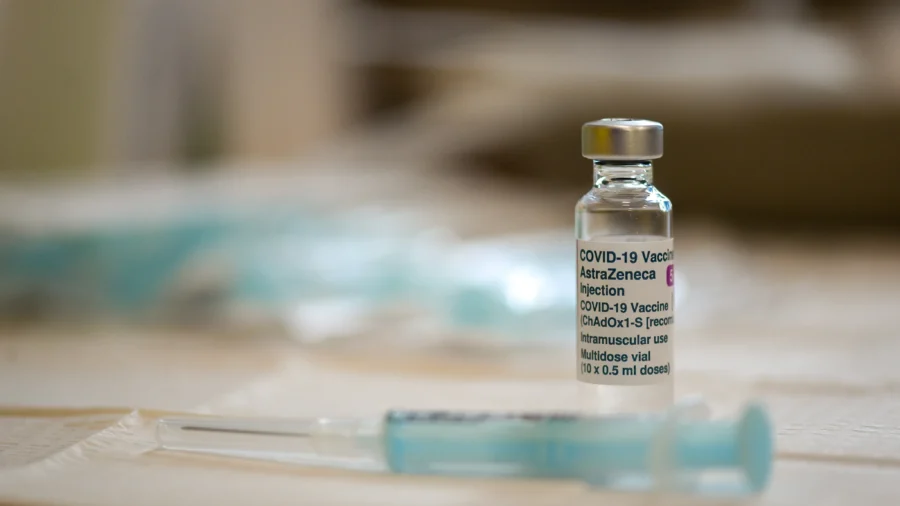AstraZeneca has commenced a global withdrawal of its COVID-19 vaccine on Tuesday, citing a “surplus” of updated jabs for new variants, months after acknowledging its rare risk of serious side effects.
The pharmaceutical giant’s jab, Vaxzevria, is no longer authorized in the European Union as of May 7, after AstraZeneca requested the withdrawal of its “marketing authorization” on March 5.
The removal of its authorization comes just weeks after the company admitted in a UK court document that its shot “can, in very rare cases, cause” blood clots and low platelets, a rare but serious condition known as thrombosis with thrombocytopenia syndrome (TSS). The company had originally denied a causal link.
However, AstraZeneca did not cite the admission as contributing to its decision. Instead, it stated that there was now an “oversupply of updated vaccines” that target new variants of the virus that causes COVID-19.
In a statement to The Epoch Times, AstraZeneca said they “are incredibly proud of the role Vaxzevria played in ending the global pandemic. According to independent estimates, over 6.5 million lives were saved in the first year of use alone and over three billion doses were supplied globally.
“As multiple, variant COVID-19 vaccines have since been developed there is a surplus of available updated vaccines. This has led to a decline in demand for Vaxzervria, which is no longer being manufactured or supplied. AstraZeneca has therefore taken the decision to initiate withdrawal of the Marketing Authorisations for Vaxzevria within Europe.”
UK Class Action
Vaxzevria, a viral vector-based vaccine, was initially authorized for use in the European Union in January 2021.
The European withdrawal follows a similar removal of AstraZeneca’s vaccine from the Australian Register of Therapeutic Goods weeks ago, on April 23.
The removal in Australia was attributed to a “business decision of the company, due to no current or anticipated future demand of the vaccine, and follows similar business decisions made overseas.”
Australia changed its official COVID-19 immunization recommendation for certain age groups from AstraZeneca’s vaccine to an alternative jab in 2021 based on evidence of linked cases of TSS.
AstraZeneca’s admission, which was revealed in a UK high court document from February that was made public in late April, came to light through a lengthy class action legal battle in the United Kingdom.
That case involved claims of dozens of injuries and deaths in the United Kingdom allegedly caused by AstraZeneca’s vaccine. More than 50 people have sued the company, along with the vaccine manufacturer, the Serum Institute of India, for compensation over claims of vaccine injuries.
AstraZeneca has denied the claims but conceded the risk of TTS.
Should the pharmaceutical giant be found liable, UK taxpayers would need to foot the bill for any settlement in the case due to an agreement with the UK government.
The AstraZeneca vaccine had previously been temporarily suspended in European countries following reports of a death attributed to the vaccine in the Netherlands and adverse effects elsewhere.
Cases have been confirmed in Australia as well, including one involving an actress who sued AstraZeneca after being diagnosed with vaccine-induced TTS, which led to a life-threatening stroke, leaving her unable to work within weeks of receiving the company’s vaccine.
According to the European Medicines Agency, Vaxzevria does not contain the COVID-19 virus itself but is made up of another virus of the adenovirus family modified to contain the gene for making a protein from SARS-CoV-2, the virus that causes COVID-19.
Though generally deemed safe and effective, TTS was reported to affect about two to three people per 100,000 people vaccinated with the Vaxzevria vaccine.
Some research has linked COVID-19 viral vector-based vaccines, such as Vaxzevria, to an increased risk of Guillain-Barré syndrome by three to four times compared to mRNA-based vaccines.
From The Epoch Times

